- Home
- G. Harvey Ralphson
Boy Scouts in Mexico; Or, On Guard with Uncle Sam
Boy Scouts in Mexico; Or, On Guard with Uncle Sam Read online
BOY SCOUTS IN MEXICO
Or On Guard with Uncle Sam
By:
Scout Master, G. Harvey Ralphson
CONTENTS
CHAPTER
I. Planning a Vacation II. A Member of the Wolf Patrol III. The Wolf Advises Flight IV. The Wolf Talks in Code V. The Wolf in the Bear's Bed VI. Two Black Bears in Trouble VII. Signals on the Mountain VIII. A Strange Disappearance IX. About the Third Suspect X. The Wolf Meets a Panther XI. Black Bear and Diplomat XII. Wolf and Panther after Bear XIII. Captured the Wrong Boy XIV. The Case is Well Stated XV. Accusing Each Other XVI. Wolves on the Mountain XVII. Plenty of Black Bears XVIII. Fremont and the Renegade XIX. What was Found Underground XX. Black Bears to the Rescue XXI. Wolves Becoming Dangerous XXII. The Call in the Rain XXIII. Some Unexpected Arrivals XXIV. The Story of the Crime XXV. Ready for the Canal Zone
DEDICATION.
This book is dedicated to the Boys and Girls of America, in the fondhope that herein they will find pleasure, instruction and inspiration;that they may increase and grow in usefulness, self-reliance,patriotism and unselfishness, and ever become fonder and fonder oftheir country and its institutions, of Nature and her ways, is thecherished hope and wish of the author. G. Harvey Ralphson, Scout Master
BOY SCOUTS IN MEXICO;
OR, ON GUARD WITH UNCLE SAM.
CHAPTER I.
PLANNING A VACATION.
"After all, it is what's in a fellow's head, and not what's in hispocket, that counts in the long run."
"That's true enough! At least it proved so in our case. That time inthe South we had nothing worth mentioning in our pockets, and yet wehad the time of our lives."
"I don't think you ever told us about that."
"That was the time we went broke at Nashville, Tennessee. We missed ourchecks, in some unaccountable way, yet we had our heads with us, and werode the Cumberland and Ohio rivers down to the Mississippi at Cairo,in a houseboat of our own construction."
The speaker, George Fremont, a slender boy of seventeen, with spiritedblack eyes and a resolute face, sat back in his chair and laughed atthe memory of that impecunious time, while the others gathered closerabout him.
Fremont was ostensibly in the employ of James Cameron, the wealthyspeculator, but was regarded by that worthy gentleman as an adopted sonrather than merely as a worker in his office force. Seven yearsbefore, Mr. Cameron had become interested in the bright-faced newsboy,and had taken him into his own home, where he had since been treated asa member of the family.
"Went broke in the South, did you?" asked one of the group gatheredbefore an open grate fire in the luxuriously furnished clubroom of theBlack Bear Patrol, in the upper portion of a handsome uptown residence,in the city of New York. "Go on and tell us about it! What's thematter with the Tennessee river, or the Rio Grande?"
"If you had no money, how did you get your houseboat?" asked anothermember of the group. "Houseboats don't grow on bushes down there, dothey?"
"Oh, we had a little money," George Fremont replied, "but not enough totake us to Chicago in Pullman coaches. The joint purse was somewhereabout $10. We built the houseboat ourselves, of course."
"Must have been a strange experience, going broke like that!" one ofthe others said. "Hurry up and tell us about it! I believe it does afellow good, once in a while, to get where he's got to hustle forhimself or go hungry!" he added, glancing at the others forappreciation of the sentiment.
"I suppose it does seem funny for some other fellow to be broke in adesolate land," said another voice, "but it isn't so funny right thereon the spot. Little Old New York looked a long way off when we were inNashville!"
The speaker, a boy of sixteen, short, and heavily built, left a windowfrom which he had been looking out on a wild March night and joined thegroup before the fire. This was Frank Shaw, familiarly known to hisfriends of the Black Bear Patrol, Boy Scouts of America, as "Fatty"Shaw. He was the only son of a wealthy newspaper owner of the bigcity, and in training to succeed his father in the editorial chair.
"So, 'Fatty' was there!" exclaimed one of the group. "How did you everget him into a houseboat? Must have been a big one!"
"Yes, Frank was there," Fremont replied, with a friendly glance atyoung Shaw. "His father sent him along to report the expedition."
"I haven't seen any book about it!" broke in another.
"Frank wrote four postal cards and nine letters," laughed Fremont. "Thecards were descriptive of the scenery, and the letters asked for moremoney."
"Why can't we get up a trip down the Rio Grande this spring?" wasasked. "The soldiers are on the border, and it would be sporty. We canstand guard with Uncle Sam."
"I want to know how Fremont got his houseboat," said one of the lads."Perhaps we can get one in the same way. It would be fun to build aboat. Anyhow, I'm for the Rio Grande trip this spring. It would beglorious."
"We might build the boat up in New Mexico," said the other, "and dropdown to the Gulf. That is, I guess we could. The Rio Grande isshallow, and large boats run only a short distance up the river, but wemight make it with a small one."
"Let Fremont tell how he built his boat and got his provisions."
"Well," Fremont began, "we were standing on the high bridge atNashville, one day, when Frank Shaw brought out the brilliant thought.He was doing a thinking part just then, for there was a fine chance ofour getting good and hungry before our checks got to us."
"Then he was thinking, all right!" a boy laughed.
"Frank explained," George continued, "that the Cumberland river hadbeen placed in the scenery for the sole purpose of providingtransportation for us to the Mississippi. Then he went on and told howwe could build a flat-boat with a cabin on it and beat the railroadsout of our fare to Cairo. So we counted our money, right there, on thebridge, and started for a lumber yard."
"It was a sporty notion, all right! Just you wait until we get ahouseboat into the dirty waters of the Rio Grande!"
"When we got the lumber, we all turned to and built the boat. We didn'tknow much about boat-building, but we used what few brains we had andgot the boards together in pretty good shape, considering. Boy Scoutscan do almost anything now, since they're learning how to helpthemselves. There isn't a boy in the room who can't build a fire withsticks and cook a good meal on it. Also, we'll show, directly, that wecan build a houseboat on the Rio Grande."
"If we are as slow at building the boat as we are in getting this storyout of you, we won't get started toward the Gulf of Mexico until coldweather next fall."
"We bought two pine planks sixteen feet long," Fremont went on, with asmile at the impatience of the boys, "a foot wide, and two inchesthick. We sloped the end so the boat would be scow-shaped, and boughtmatched flooring for the bottom. We put tar into all the seams, jointsand grooves to keep the water out. Then we bought half-inch boards andbuilt a cabin at the back end. That never leaked, either. The boatwas sixteen feet long and six feet wide, and the bulliest craft thatever went anywhere. When we got to Cairo we sold it for $6, and thathelped some."
"Tell us about your eatings. We'll have to cook when we get down tothe Rio Grande. Where did you get your cook stove?"
"We nailed a piece of sheet-iron on the prowboard," laughed Fremont,"and put the bottom section of an old-fashioned coal stove on that. Thehole where the magazine used to fit in made a place for the frying pan,and the open doors in front, where the ashpan used to be, took in thewood we collected along the river. Cook! We could cook anythingthere."
"What about the sleepings?" was a
sked.
"That was easy. We bought an old bedtick and stuffed it with cornhusks, then a pair of back-number bed-springs, which we put on thefloor of the cabin. Sleep! We used to tie up nights and sleep fromnine o'clock until sunrise.
"With the money we had left we bought bacon, eggs, corn-meal, flour,butter and coffee. There wasn't much of it, because we had littlemoney left, but we thought we might get fish on the way down. We nevergot one. They wouldn't bite. Still, we had all we needed to eat, andfound our checks at Cairo. It took us eight days to float to theMississippi. We were told at Nashville that we would spill out on therapids, that river pirates would rob us, and that the big boats wouldrun us down or tip us over, but we never had any trouble at all. We'llknow better than to listen to such talk when we set afloat on the RioGrande this spring."
"It was better than walking," said Frank.
"Frank was frisky as a young colt all the way down," Fremont added."There are little trading places all along the river banks, kept mostlyby farmers. When you want to buy anything you ring a bell left in viewfor that purpose, and the proprietor comes out of the field and waitson you. Frank wanted a record of being the prize bell-ringer, and oncehe got to the boat just a quarter of an inch ahead of a bulldog withred eyes and bowlegs.
"He holds the world's record for speed," Fremont continued, with afriendly glance at Frank. "The faster he runs the whiter he gets,through fear, and he left white streaks behind him all along theCumberland river. Now, how many of you boys are ready for a trip downthe Rio Grande, and, possibly, over into Mexico?"
Every boy in the room shouted approval of the plan, and Frank said hewould go as war correspondent.
"It will be exciting, with the soldiers on the border," Frank said,"and I may make a hit as special news writer."
All was now excitement in the room, the story of the trip down to theMississippi having stirred the lads' love of out-of-door adventure tothe sizzling point. They capered about the handsome room in a mostundignified manner, and counted the days that would elapse before theycould be on their way.
The club-room was in the residence of Henry Bosworth, whose son, Jack,was one of the liveliest members of the Black Bear Patrol. The wallsof the apartment were hung with guns, paddles, bows, arrows, foils,boxing-gloves, and such trophies as the members of the patrol had beenable to bring from field and forest. Above the door was a red shield,nearly a yard in diameter, from the raised center of which a Black Bearpointed an inquisitive nose. The boys were all proud of their blackbear badge, especially as no Boy Scout patrol was so well known in NewYork for the character and athletic standing of its members.
On this stormy March night-one long to be remembered by every member ofthe party--there were only five members of the Black Bear Patrolpresent. These were Harry Stevens, son of a manufacturer ofautomobiles; Glen Howard, son of a well-known board of trade man; JackBosworth, son of a leading attorney; George Fremont, adopted son ofJames Cameron; and Frank Shaw, son of a newspaper owner.
They had been planning a trip to the South all winter, and now, as hasbeen said, the mention of the journey down the Cumberland and Ohiorivers to the Mississippi had so fired their enthusiasm for the greatout-of-doors that they were ready to start at short notice. They tookdown maps and hunted up books descriptive of Mexico, and so busiedthemselves with the details of the proposed trip that it was aftereleven when their minds came back to the common things of life.
"Well," Harry Stevens said, then, "I've got to go home, but I'll behere to-morrow night to talk it over. As Glen says, the Rio Grande delNorte is a funny kind of a stream, like all the waterways in thatsection of the country, bottom full of sand, and all that, but Ipresume we can float a houseboat on it."
"Of course we can," Glen put in. "It doesn't take much water to run ahouseboat. If we get stuck, you can wire your father to send a motorcar down after us."
"He would do it, all right," replied Harry. "We'll take an auto tripacross the continent, some day. Good night, fellows."
"I must go right now," George Fremont said. "Mr. Cameron is at theoffice, working over the Tolford estate papers, and he asked me to callat the rooms and go home with him. He's always nervous when workingover that case. The heirs are troublesome, and threatening, I guess."
Frank Shaw walked with George to the nearest corner, where the latterdecided to wait for a taxicab. The night had cleared, but the wind offthe Bay was still strong and cold.
"I've a notion to ride down to the office with you," Frank said, asthey waited. "You could leave me at home on the way up."
"I wish you would," Fremont said. "Skyscrapers are uncanny after dark,and the elevator will not be running. Mr. Cameron will be glad to seeyou. Come on!"
Frank hesitated a minute, and then decided to go on home, so the boysshook hands and parted for the night. Many and many a time after thatnight they both had good cause to remember how different the immediatefuture of one of their number would have been had Frank obeyed hisfirst impulse and gone to the Cameron building with his friend.
When, at last, Fremont was whirled up to the front of the Cameronbuilding he saw that there were lights in the Cameron suite. Believingthat his benefactor would be there at his work, Fremont let himself inat the big door with a key and started up the long climb to the sixthfloor.
The vacant corridors, as he passed them one by one, seemed to him to bestrangely still. Even the people employed at night to clean the hallsand offices were not in sight. The boy started suddenly half a dozentimes on the way up, started involuntarily, as if some uncanny thingwere spying out upon him from the shadows.
Then he came to the Cameron suite and thrust his key into the lock ofthe door. He had been told that he would find the door locked from theinside. Then, his premonition of approaching evil by no means castaside, he pushed the door open and looked in upon a sight he was by nomeans prepared to see.

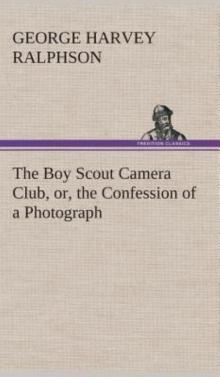 The Boy Scout Camera Club; Or, the Confession of a Photograph
The Boy Scout Camera Club; Or, the Confession of a Photograph Boy Scouts of Lakeville High
Boy Scouts of Lakeville High Boy Scouts in the Northwest; Or, Fighting Forest Fires
Boy Scouts in the Northwest; Or, Fighting Forest Fires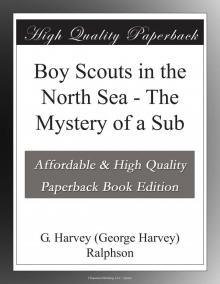 Boy Scouts in the North Sea; Or, The Mystery of a Sub
Boy Scouts in the North Sea; Or, The Mystery of a Sub Boy Scouts Mysterious Signal; Or, Perils of the Black Bear Patrol
Boy Scouts Mysterious Signal; Or, Perils of the Black Bear Patrol Boy Scouts on Hudson Bay; Or, The Disappearing Fleet
Boy Scouts on Hudson Bay; Or, The Disappearing Fleet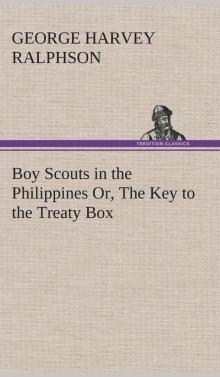 Boy Scouts in the Philippines; Or, The Key to the Treaty Box
Boy Scouts in the Philippines; Or, The Key to the Treaty Box Boy Scouts In Russia
Boy Scouts In Russia Boy Scouts on the Open Plains; Or, The Round-Up Not Ordered
Boy Scouts on the Open Plains; Or, The Round-Up Not Ordered Boy Scouts in Mexico; Or, On Guard with Uncle Sam
Boy Scouts in Mexico; Or, On Guard with Uncle Sam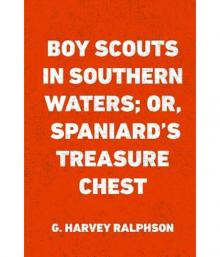 Boy Scouts in Southern Waters; Or, Spaniard's Treasure Chest
Boy Scouts in Southern Waters; Or, Spaniard's Treasure Chest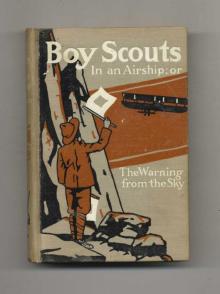 Boy Scouts in an Airship; Or, The Warning from the Sky
Boy Scouts in an Airship; Or, The Warning from the Sky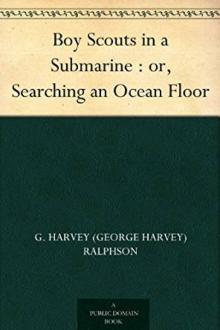 Boy Scouts in a Submarine; Or, Searching an Ocean Floor
Boy Scouts in a Submarine; Or, Searching an Ocean Floor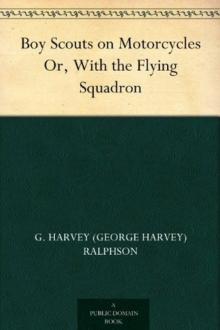 Boy Scouts on Motorcycles; Or, With the Flying Squadron
Boy Scouts on Motorcycles; Or, With the Flying Squadron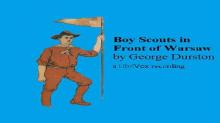 Boy Scouts in Front of Warsaw; Or, In the Wake of War
Boy Scouts in Front of Warsaw; Or, In the Wake of War Boy Scouts on Picket Duty
Boy Scouts on Picket Duty Boy Scouts of Bob's Hill
Boy Scouts of Bob's Hill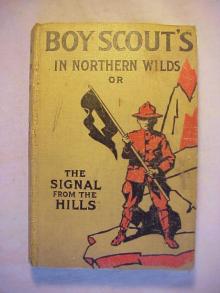 Boy Scouts in Northern Wilds; Or, The Signal from the Hills
Boy Scouts in Northern Wilds; Or, The Signal from the Hills Boy Scouts in the Canal Zone; Or, The Plot Against Uncle Sam
Boy Scouts in the Canal Zone; Or, The Plot Against Uncle Sam